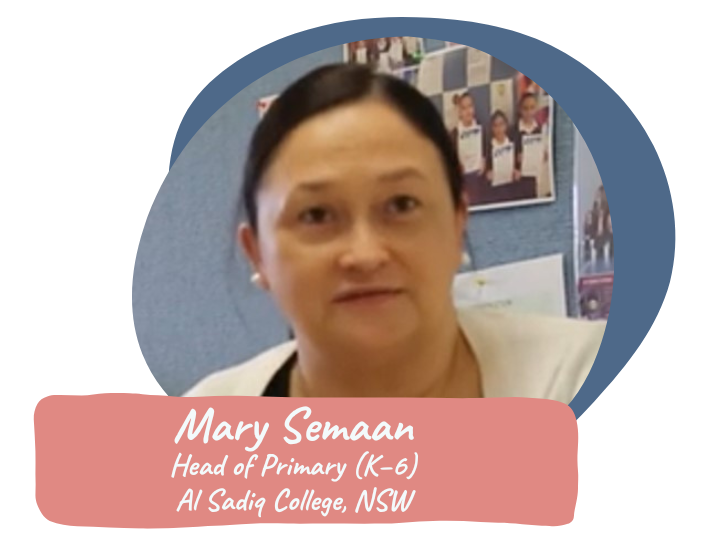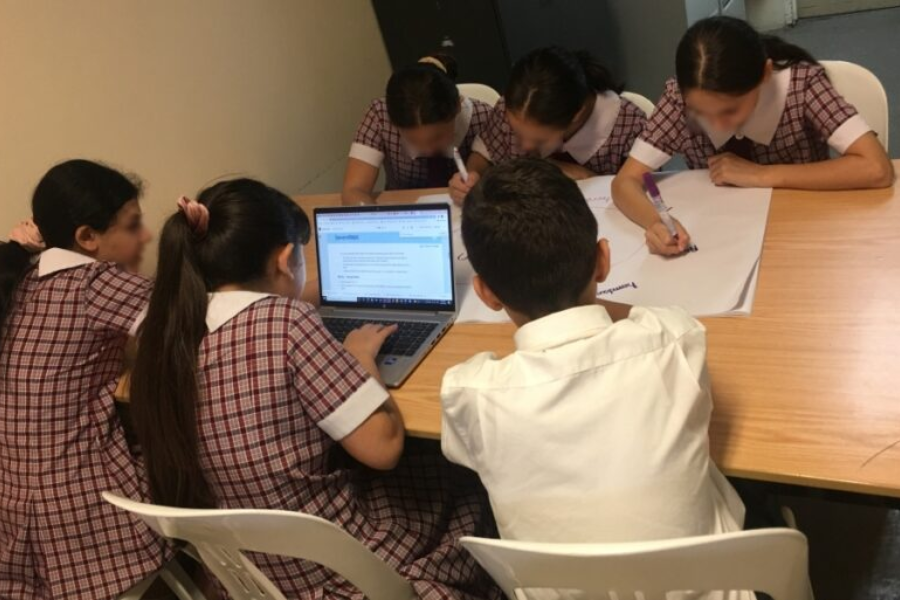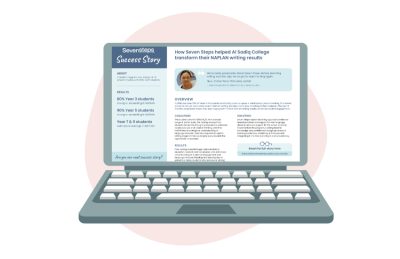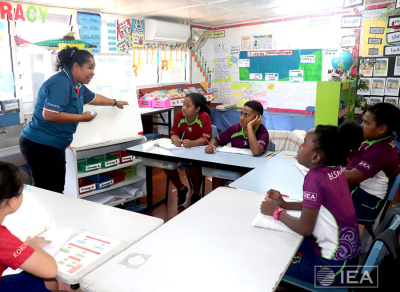No products in the cart.

8 min

Success Story

Rebecca Hill
Al Sadiq College is a K–12 school in Sydney where the majority of students come from non-English speaking backgrounds. When Mary Semaan joined the school as Head of Primary (K–6) in 2018, less than 25% of Years 3–6 students could compose a ‘satisfactory’ piece of writing. Semaan and her team resolved to not just reach state level in NAPLAN writing, but also instil a love of writing in their students. Since implementing the Seven Steps, their NAPLAN writing scores have continued to improve year after year.
We’re really passionate about Seven Steps. Before, teaching writing was like: Ugh, we’ve got to teach writing again. Now, it’s like: Wow! This really works!


Challenge
Improve writing outcomes across a cohort of EAL/D students
NAPLAN results for writing were consistently low at the school. Pre-testing showed that students lacked the thought processes for extended vocabulary use and creative thinking, and they had limited knowledge or understanding of language features. Writing skills were not taught explicitly.
Semaan needed a program that could cater to a student cohort that’s 100% EAL/D and with a broad range of ability levels, including both learning support and enrichment students.
‘We wanted a writing program that was going to be explicit but at the same time, we wanted something that was going to give every student the opportunity to succeed,’ says Semaan.

Solution
Support all students with a school-wide approach to improving writing
Semaan and her team were drawn to Seven Steps’ explicit teaching approach and evidence-based practices. ‘It fit in with our pedagogy really well because we taught it explicitly, but we could also go into deep learning because our kids were asking questions and being creative thinkers using Seven Steps, so we actually met both sides,’ says Semaan.
And the support for oral language development was vital for their EAL/D students. ‘If you can’t say it, you can’t write it, so speaking is very important for our students. And the Seven Steps approach helps develop oral language.’
The school carefully implemented the program, building teacher knowledge and confidence through professional learning workshops, modelling techniques and integrating it into their planning in a structured way. Teachers were supported further with access to Seven Steps online platform, Teacher Hub.

Results
Huge growth in writing, other learning areas and student engagement
In just 12 months, post-testing revealed huge improvements in students’ creativity and vocabulary, and enhanced understanding of audience engagement and language features.
‘It was almost like they were different children. They had a different mindset in terms of their writing,’ says Semaan. ‘And the more they do it, the better they’re getting. Our teachers are becoming better teachers of writing too.’
Their NAPLAN results show continued writing growth. In 2023, 80% of Year 3 and 90% of Year 5 students achieved at ‘strong’ or ‘exceeding’ level in NAPLAN writing. Students in Years 7 and 9 also performed ‘well above average’. Many students who are now achieving at ‘strong’ or ‘exceeding’ were once receiving learning support, an outcome that has thrilled Semaan and her team.
Beyond NAPLAN success
Since implementing the Seven Steps, teachers at Al Sadiq report benefits that extend well beyond NAPLAN writing success, such as improvements in students’ reading, spelling and oral language skills.
Teachers also feel better equipped to teach writing now and students’ confidence and enthusiasm for writing has grown exponentially.
Wins beyond the school gates have further buoyed the community, such as success in the NESA Write On competition and even the Australian National Virtual Debating Competition.
Despite undertaking a debating course before entering the competition for the first time, Semaan says it was Seven Steps that made the difference. ‘We ended up doing so well because students used the Seven Steps persuasive techniques to build and structure convincing arguments. And our kids knew the techniques to engage the adjudicators,’ says Semaan.
Students made it to the knockout stage in the virtual debate, and second place in the Islamic tournament. ‘This was huge for the kids,’ enthuses Semaan. ‘And huge for the community as well.’
Share this story with your school
Download this snapshot of Al Sadiq’s story of writing improvement.








